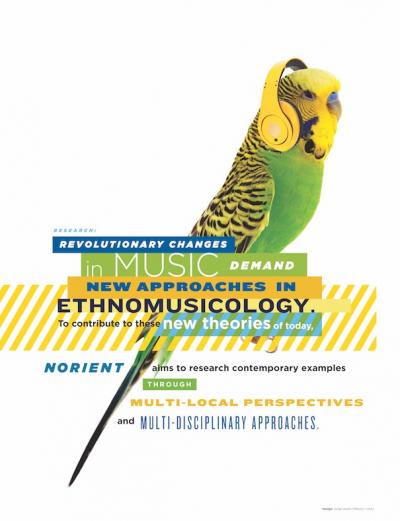Martin Stokes has been researching Middle Eastern music for over thirty years now. To begin the chapter on Exotica in the Norient book Seismographic Sounds (see and order here) we asked for his experience and knowledge. What have been main concepts and discussions on the subject of Exotica in ethnomusicology over the course of time? Is listening to «foreign» music a private matter or a political activity? And what happens to Exotica when unfamiliar sounds are only a few mouse-clicks away? These and other questions we discussed with him over the course of several emails.
[Thomas Burkhalter]: Many musicians and sound artists in non-western countries keep telling me in interviews that they want to be «modern» and «in the world». They produce indie rock, rap or electronic music. They shy away from local music styles as they are for them linked to conservatism, tourism or political propaganda in their home countries, or to Euro-American centrism or Orientalism. Some musicians react with parodies on exotica. How would you theorize these different standpoints?
[Martin Stokes]: They want, in my experience, to feel connected, not marginalized. They also want to be in the market, on acceptable terms. They want to be able to travel. For most, all of this is very, very difficult indeed. «World Music» has provided a certain kind of institutional and commercial framework. Being visiting artists in universities and other cultural institutions provides another. State patronage – musicians as cultural ambassadors, musical diplomacy – is propaganda, as you put it. I often notice that the people who manage to make their way in the West become, for those left behind, objects of fascination and frustration. Trapped energies of this kind create rich environments for satire and parody.
[TB]: Where are the differences between exoticism, othering, primitivism, ethnocentrism, Orientalism and colonialism?
[MS]: They overlap and shade into one another, obviously. All human beings «other». They find ways of categorizing themselves on the basis of some property of «sameness», from which outsiders are excluded, and seen as strange and mysterious («exotic»). We shouldn’t forget that we «same», even as we «other», and that these self-other boundaries are often highly flexible and porous. They are there, in a sense, to enable movement, not only to inhibit it. «Ethnicity» was once used to define outsiders. «They» have it, «we» don’t. Only in the 19th century did it become a positive quality, associated with the new nation-states, who sought to construct ethnic identities for themselves where the great empires denied them. And only in the 20th century did «ethnocentrism» – the inability to understand or sympathize with people who don’t share this thing we came to call an «ethnic identity» – become a perceived problem. The history of the term «ethnicity» is quite instructive. Colonialism produced the modern lines across the map separating «us» from «them.» These lines are still with us in one shape or another. Orientalism was the intellectual movement, seeking in «the Orient» the origins of things, and in Islam the cause of their stagnation: colonialism’s task was one of protecting «the Orient» from itself, in music as in all other things. Primitivism looks the other way, to an Edenic vision of uncorrupted social and artistic life amongst those free of the burden of civilization: Africans, Polynesians, Celts. These various terms are the keywords in the metropolitan fantasies that have shaped so much 20th century musical life in the West, from Claude Debussy and Béla Bartók to David Byrne and Brian Eno.
[TB]: Philosopher Barbara Engh wrote: «The racist love for cultural difference is mostly linked to woman, and to music.» To what extent is exoticism simply a human phenomenon? To what extent is it a result of colonialism?
[MS]: Western musical ideologies, since the 19th century, have posited music as a space of intellectual and emotional play beyond the reach of «politics». What we do there, according to these ideologies, «doesn’t count», in one sense, but, on the other, is all-important as a site of self-making. It overlaps, precisely, with the idea of the private sphere in capitalism. Hence Engh’s quote. We can’t understand music (and, especially, «exotic music») in the modern world unless we at least start off by accepting its connections with – and role in justifying and naturalizing – the more systemic patterns of violence in modern life. Modern thought and culture can’t escape its fixation with cultural difference. We have to find citizenly ways of inhabiting it. We have to find ways of dealing with the problems that arise when you turn exoticism into a commodity. We have to develop a language of sameness, access and inclusion to set against the language of difference, otherness and exclusion.
[TB]: Can you expand on these connections between public violence and private pleasure? What role and function can exoticism in music play in our modern world?
[MS]: What is positive is that most of us, at least in the metropolitan west, live in more or less global worlds. Exoticism is unremarkable. The «Other» is an everyday fact of life. Public culture in the West is, almost by definition these days, «multiculture». What is negative is exactly this unremarkableness, this banality. The challenge to self-reflection, the sense of aesthetic and political provocation has gone. It’s become comfortable, routine. As a consequence, racial and gendered stereotypes dig deeper, are harder to change or challenge.
[TB]: On the YouTube platform one finds micro-genres like seapunk and vaporwave that play with images of masks, palms and islands, and they manipulate sounds of steel drums and unfamiliar instruments. Can one continue to discuss these clips under the rubric of «exoticism»?
[MS]: I think your examples show what a broad and mixed field contemporary exoticism is. They also underline my point, I believe, about the banalization of the exotic. Seapunk and vaporwave involve a kind of playful nihilism, born of the idea that the sensory apparatus is in a permanent state of exhaustion and confusion, that signs have become unstuck from meanings, and that ironic distance is the ethical sensibility appropriate to our times. Philosophically I don’t find this terribly interesting, and certainly not new, I’m afraid. I think these micro-genres probably do function, though, as an interesting space of cross-cultural communication, technology sharing, and creative sociability. As for where this will lead, as usual, I think it is far too soon to say! We are learning to imagine only now the important relationships between the counterculture of the 1970s (including punk rock), Silicon Valley’s dot com culture and the broader configurations of neoliberal governmentality. Popular cultural movements usually insist on erasing the past, on declaring it null and void. But one’s got to take the longer view.
[TB]: What are some of the main challenges when sampling and remixing «cultural markers» in music?
[MS]: Much has been said and written about, for instance, David Byrne and Brian Eno (My Life in the Bush of Ghosts) in this regard. For me the exercise is more or less successful to the extent that the others involved have been partners in a real conversation, that the sampling process is, in some rather deep sense, understood. This takes time, and we don’t all have time, and sometimes things just have to be done quickly, to seize the moment. But when I’m listening to «multiculti» music, electronic and sampled, or put together in live, acoustic situations, I’m reassured to the extent that I feel some kind of mutually destabilizing dialogue is underway, and that we are not listening to something where everyone has been assigned a place and is acting a role in somebody else’s drama.
[TB]: Can you expand on what you mean by «mutually destabilizing dialogue»?
[MS]: Conversation should move participants. By this I mean it should be emotionally engaging and engrossing. And I also mean that it should take you someplace else intellectually. This doesn’t mean you change your mind about things every time you meet somebody new. It means you should find yourself reflecting on what you thought you knew from some other place. Maybe you’ll come back to it, but you’ll do so enriched. What is true of words is true of music, in my view.
[TB]: Today, foreign sounds are just a few mouse-clicks away – nothing seems far anymore. Is the «exotic» therefore disappearing?
[MS]: A dictionary definition of «exotica» I’ve just looked up gives me, inter alia, «strange in effect or appearance». I like this definition, with its emphasis on the affects and the sensory apparatus. It gets at that buzz of unfamiliarity on hearing musical sounds in a musical language not your own, or one you’ve not yet learned. It gets at that frisson of difference, when you see people around you responding passionately to something you don’t yet quite follow. It’s something felt on the skin, somewhere in the muscles, a kind of movement within the body, so in an important sense already there – a kind of thought, yes, but of an environmentally engaged and sensory kind. It is important to dwell with this feeling, to return to it and inhabit it, perhaps for a long period of time, to allow it to provoke political sympathies, to provoke the desire to learn (languages, musical styles, poetic traditions) and ask questions, and to teach others, where one can, in turn. And one needs time to learn how to work it into and change one’s own musical worlds, to generate the life-long dialogues and friendships, which take one ever deeper. That frisson eventually becomes, I believe, not one of «difference» but of communication, sharing, reciprocity – one of living and evolving human relationships. It’s a feeling – a «structure of feeling» perhaps, to use Raymond Williams’ useful phrase – and it’s one that might involve changes of intensity but that can, nonetheless, be maintained over considerable periods of time. I’ve been researching Middle Eastern music for thirty years now, for instance, and it’s still there. As I mentioned earlier, the banality and ubiquity of the exotic, the mouse-click availability of «the exotic», hugely complicates this, tying us into massive corporate and surveillance systems. But one mustn’t be deterred. The alternative is, for far too many people these days, at least in Western Europe, a hatred of cultural difference. A «love for cultural difference» is, in this context, by far the lesser evil.
[TB]: Are there institutions, producers or even musicians to blame for this «lesser evil» – meaning the production and distribution of banal versions of exotica? From my experience I would criticize funders and multipliers first: curators, arts councils, NGOs, movie directors, music journalists who spend too little time in research and bring forward the first music from a foreign place they can find? Or are our hands tied? All is a consequence of neoliberalism, and so everyone works under economic pressure and no one has time?
[MS]: The expression «lesser evil» implies, at least to me, that all of us are complicit in the politics of, and commerce in, exoticism in some way or another. There’s no position of moral externality here. So I’m not one to judge. If moral judgment is required I think it should focus on institutions, for the most part, and not individuals. The university environment I inhabit grants us – supposedly – the luxury of time and reflection. It certainly doesn’t always feel like that to me, but, relatively speaking, yes, we have that luxury. So, inevitably perhaps, I tend to have a large measure of respect for projects where the people involved take their time over things, and people, and languages and social and cultural contexts, and the learning of instruments and vocal traditions, whether in university environments or not (something like Philip Yampolsky’s amazing series of Indonesian recordings for the Smithsonian, for instance, which took shape over decades). People in the world of journalism, arts councils, media, curatorship of one kind of another and so forth often have less time to make their decisions, more direct pressures to meet, and meet quickly, the demands of funders, audiences, customers or license payers. This doesn’t preclude great work, when the people organizing are inspired, energetic and persistent creatures – look at Songlines, for example. I do get somewhat frustrated at the kind of consultation going into supplying «ethnic» music for western TV documentaries at the moment. Who is responsible for this? Ever since Peter Gabriel used Vatche Housepian and Antranik Askarian’s duduk on his soundtrack for Scorsese’s Last Temptation of Christ – a sound to my mind associated entirely with Christian Armenia – the duduk seems to be used indiscriminately to accompany any shot involving a mosque, a camel, a sand dune. Today’s snake-charmer music I guess – a sonic cliché of Islam. And I do get frustrated with a lot that is going on at the moment in the global NGO environment, in which western classical music, or western classical music values of some kind or another are presented as the answer to global unemployment, histories of political injustice, systemic poverty. It makes a nice story for the liberal newspapers, but to me it simply seems colonial, a western civilizing mission, hardly even thinly disguised. The problems of exoticism are significantly smaller, to my mind, than the problems of this kind of cultural colonialism.
[TB]: Ethnomusicology since its beginnings in the early 1900s often focused on non-western music. Scholars from the US and Europe travelled to foreign places, often lived there for a while, studied music and culture, started to play local instruments, and then went home to publish academic books that we now find in libraries in the US and Europe. Some – as you mentioned – also recorded local music and released it on European or US labels. When you look back into the history of ethnomusicology and how it has studied non-western music – and bearing in mind the topic of exoticism – how have approaches of research changed?
[MS]: In the second half of the century anthropologists and ethnomusicologists started to spend longer periods of time in situ studying «exotic» cultures as, well, «cultures» – people probably just like us, for all their apparent strangeness. When I started studying anthropology we were taught to «seek the familiar in the strange, the strange in the familiar», because anthropology could, after all, also be done «at home». The «exotic» was, only half a century ago, «another place», and a distant one at that. It was also a scarce resource. When I started getting interested in non-western music, towards the end of the 1970s, there was a tiny section of the shop in Oxford I used to visit in the Covered Market (no longer there, alas) marked «Folk and Exotic». World Music hadn’t quite been invented then! The man in the shop would put aside the kinds of Asian classical musics he knew I was interested in. This was where I accumulated quite a collection of some of those old ethnographic discs, Nonesuch, Traditional Crossroads, the UNESCO series and so forth. I would buy two or so a week, and play them to death. That now seems a very long time ago. The lines between «us» and «them» have now not exactly disappeared but become a much more complex proposition, as have «our» positions in relation to them. Who and what exactly do these pronouns now signify? Recognizing this has been an achievement of sorts. A consequence is that ethnomusicology can now be about modern, everyday worlds, not just remote and exotic places.
[TB]: Where do you see the biggest challenges of ethnomusicology today? How and to what extent could ethnomusicology help to find a way out of what you call the «lesser evil»?
[MS]: We’ve all had to struggle with the transformation of the university system over the last twenty years or so, a world that is steadily becoming more commoditized, depoliticized and bureaucratized. Ethnomusicology can hardly shoulder the blame for that alone, but of course it’s been part of the story. How can we exempt ourselves? A problem, for me, has been the way we have drawn institutional lines between critique, creativity and performativity, thinking of them, and teaching them, as separate zones of human experience and world-making. I hope we’ll eventually figure out a more combative stance in the face of everything that’s been going on in the name of higher education, certainly in my own country. I also think music education is getting more and more conservative. There’s been a reaction to the (quite politically conscious) «new musicology» of the 1990s. We face ever more politically disengaged students. This worries me, and ethnomusicology surely has a responsibility here.
[TB]: To what extent is ethnomusicology for you a political project? And to what extent is it about research only?
[MS]: It’s hard to say where one begins and the other ends. Research that is about demonstrating some political point or position is often weak research. Research must be open-ended. It must move you, as I said above about conversations. So I think it is an important distinction, even as I often find it hard to make in practice. But I think all good research is motivated by an ethical and political sensibility of some kind or another.





